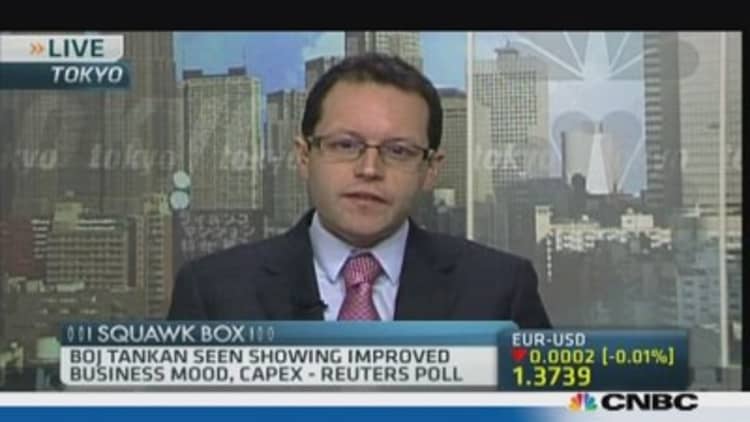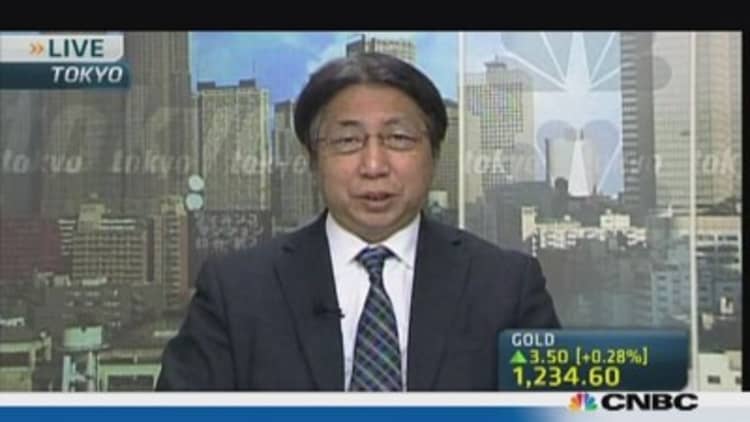
Japan's exporting powerhouses may have gotten a huge boost from the weaker yen, but those stocks may be the worst plays on the country's recovery, a fund manager said.
"Just because the yen is weak doesn't mean to buy exporters," said Nicholas Weindling, the manager of JPMorgan's Japan Yen fund, which has around $277.8 million under management. "It's the biggest misconception. It's exactly where we think you shouldn't be investing right now."
Japan's big exporters face a structural decline in key products, such as cameras, printers and copiers as the ascendance of smartphones and tablet computers weighs on demand.
(Read more: Business sentiment in Japan hits a 6-year high)
"The companies that made Japan great 15 to 20 years ago are not the ones that'll be great in the future," he told CNBC. "The structural trend is quite negative even in those companies quite strong at what they do."
Weindling advises avoiding index funds as they are weighted toward export stocks, suggesting less obvious plays on the strong domestic economy, such as real-estate on expectations rents will increase, retail and credit cards companies on expectations of rising consumer spending and banks on expectations loans will rise.
His fund's performance may support his bearish call on exporters, as it is up around 88 percent for the 12 months through November, compared with the Nikkei's around 46 percent rise year-to-date.
(Read more: Place your bets: China or Japan?)
Around 50 percent of his portfolio is a bet on Abenomics, or the around one-year-old plan from Japanese Prime Minister Shinzo Abe to use an aggressive mix of monetary policy, fiscal stimulus and economic reform to kick-start Japan's long-moribund economy.
"People are still very skeptical of all aspects, but I think it's going very well, better than hoped," he said.
"Definitely things are getting better here. It doesn't matter whether it's at the capex level or consumer sentiment, or spending or housing. That's what we see happening right now," he said. "Profits here in Japan are up 50 percent this year. That's a huge number. So companies have the flexibility to spend more where they want to."

Bet on aging plays
Avoiding exporters isn't Weindling's only non-consensus call. While many cite Japan's aging demographics as a potential headwind for the economy, Weindling likes plays on that theme.
"The beauty of that as an investment theme is it is so long term and so certain. It's certain the population will fall and the number of old people will increase," he said, suggesting plays on health care and adult diapers.
In addition, he sees value in staffing companies, not only because wages are expected to rise, boosting their profits, but also on the difficulty many sectors are facing finding workers with the country's unemployment rate around 4 percent.
(Read more: And the next driver for Japan stocks is…)
To be sure, not everyone is negative on the exporters. While agreeing that many of the consumer electronics exporters, such as camera makers, face structural headwinds, "don't short these names," said Ben Collett, head of Asian equities at Sunrise Brokers.
"Blanket selling the exporters is a very risky trade," he added. He noted comments from Honda over the weekend that it would raise wages if it reached profitability targets. Wage increases are seen as a key plank in the success of Abenomics, as they are needed to drive domestic consumption.
"They need growth on the bottom line. The easiest way is to weaken the yen," Collett said, noting he expects the currency to continue to depreciate, which is likely to push up the exporters' shares.
(Read more: HSBC strategist: Am I the last person in the world underweight Japan?)
In addition, he noted the structural theme may have played out already.
"Even though the camera makers will underperform other exporters, the theme isn't new and the price in Canon isn't high," he said, adding the stock is seeing some short-covering.
Even Weindling isn't entirely negative on the exporters, just very selective. He likes factory automation exporters, noting with China's wages rising, companies will need to either move production or automate, a segment where Japan's companies have a clear leadership position.
—By CNBC.Com's Leslie Shaffer; Follow her on Twitter @LeslieShaffer1

